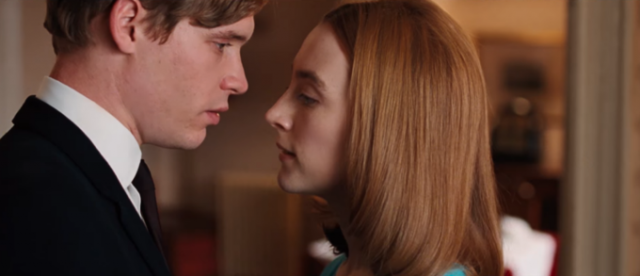On Chesil Beach: Groping Through the Past, by Scott Nye
There are two common complaints one usually has to endure from avid readers about film adaptations, and often film in general – that the cinema leaves nothing to the imagination and no room for the interior life. Books clearly do both better, they say. Well, as Sonny and Cher say, I don’t know if all that’s true, but in any event, the hurdle is often encountered when adapting novels that are particularly heavy on thought, prose, and exposition. Overcoming this usually requires a particularly deft screenwriter or director. First-time filmmaker Dominic Cooke and screenwriter Ian McEwan, adapting his own novella, show some promise here and there, but are not what I would call particularly deft in bringing On Chesil Beach to the screen.
We meet the newly-wedded Edward (Billy Howle) and Florence (Saoirse Ronan) at their hotel on the first night of their honeymoon, in the summer of 1962. The wedding couldn’t have gone better, we gather, and they’re deeply in love. They’re also deeply nervous. They both know what’s expected of the first night of a honeymoon, and have very different, very traditionally gendered, degrees of enthusiasm for it. Edward seems on the point of exploding, unsure exactly of how to begin, and Florence is running out of ways to delay things.
I skimmed McEwan’s novella for this review, and was very interested to find that it manages the tension of this long evening differently than the film. In prose, McEwan lets their minds wander (or rather, his mind wander about them), to describe a bit about their past and themselves, to think of how that past and their nature might impact their present and future. The approach in translating it to screen seems to be to tear out the imaginative interior and leave it plainly on the table for viewers in the form of flashbacks that the book largely omits.
These flashbacks are occasionally charming, but largely devoid of much interior drama themselves and mostly urged on by predictable signifiers – she’ll say “tell me about your last fight” and we’ll jump back to that day, or he’ll mention his mom’s illness and we’ll get a cutaway explaining that. How often does our memory really work that way? What Chesil Beach largely avoids is randomness, a fleeting glimpse or stray thought not clearly connected to the present yet somehow resonant. The cuts between time periods are quite jarring and violent, often moving from a wide shot to a close-up for added emphasis, suggesting aesthetically a great remove from the past where the narrative seems to want them intertwined.
This makes Edward and Florence’s attitude towards each other stand out all the more. Anxiety is obviously driving the evening, but they are so carefree in the flashbacks and so awkward in the present that, coupled with the sharp editing, makes them seem like wholly different people. In the flashbacks, Florence is so assertive and direct and Edward so calm and good-natured; in the present, we see only her terror and a great deal of his blundering, bordering on bullying, overeagerness. Couldn’t those qualities have been drawn out in at least one flashback? It’d be one thing if the flashbacks presented themselves as some rose-colored view, that the characters don’t quite remember themselves, but this is largely unsupported by the rest.
It’d be another thing, too, if the film were to engage with the way sexual desire (or repression) can turn us into very different people, or how the pressures of marriage urge us to conform rather than find a better expression of one another. Florence’s apprehension is not uncommon for young women, especially in this period of English history. What little sex education she can glean is from a book she finds on her own and has to make sense of with no help from anyone else. Rather than engage with this, though, the film mounts a late stage psychoanalysis, tracing Florence’s sexual repression back and suggesting the only reason why someone might resist something large and hard being shoved inside of them is due to a larger emotional issue rather than just, well…it’s actually kind of freaky already.
On Chesil Beach has the usual contemporary signifiers of a period-piece literary adaptation – sharp, slightly muted, pastel costuming; the appearance of a “natural” lighting scheme; a somewhat restless camera. Cooke, a stage director, has a fine, even eye for performances, not letting even the script’s more eccentric characters run away with the tone nor wringing the physical life out of his actors for fear they’ll escape his new frame. Howle is making a bit of a splash this spring with both this and The Seagull out at the same time, and without being terribly notable in either, has a terrific amount of energy that, when harnessed, is quite engaging. He gets the film’s biggest laugh trying to remove a shoe in the course of foreplay, and the film’s biggest swoon when he first catches Florence’s eye at a protest. Ronan (also in The Seagull, strangely) is better served to make a mark, and so does – the camera is more curious and less admiring of her, which lets her take control of a great many scenes. Florence’s confidence is so arresting in the flashbacks, and if there’s one thing that links those to the film’s present, it’s the way Ronan lets Florence continually retreat to an I-know-best mentality that misguides her.
Bleecker Street has three of the best films I’ve seen so far this year – Disobedience, Unsane, and the upcoming Colette – but Chesil Beach feels more in the mold they had heretofore established of indistinctive films with the air of respectability and little of the vision. So much of the film should work that it’s a small wonder so little does.




























